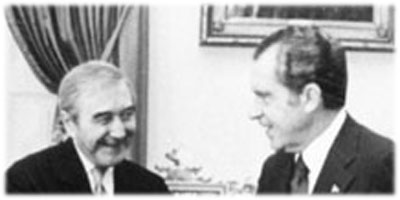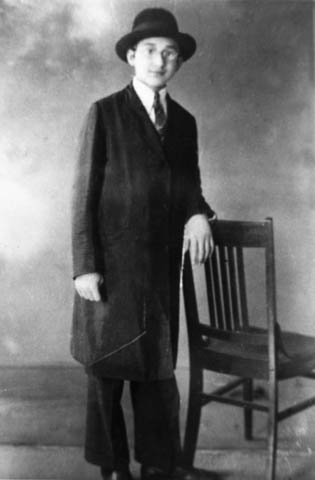The Professional Korff

|
RABBI BARUCH KORFF The Professional Korff |
|
In his professional life, Baruch Korff was an extremely complex man who strived to make a difference in the world. His friend, the Right Reverend George N. Hunt, Bishop of the Episcopal Diocese of Rhode Island, described his esteemed colleague in this manner:
"One cannot give a portrait of Baruch Korff without being sidetracked by the many turns his career took. First as educator, as head of a Yeshiva, then as a pulpit rabbi serving simultaneously as Psychiatric Chaplain for the Department of Mental Health, as ghost writer for members of Congress and U. S. government agencies, as diplomat with many missions to the Middle East and sub rosa junkets to trouble spots, as advisor to presidents, and always, always in the thick of controversy, petrol ready to be ignited. Baruch has never been a community leader in the classic sense. But he has always stirred, motivated, and propelled thousands with his magnetism. Once he adopts a cause he may never be dissuaded....”[1]
Baruch began his political career as a speech writer for Representative John W. McCormack, Majority Leader of the U. S. House of Representatives, later wrote speeches for Senator Orrin G. Hatch and others, and ultimately became known as "Nixon's Rabbi" for his role as a consultant to President Richard M. Nixon during the Watergate era. How did a yeshiva bocher from the Ukraine come to be the advisor of presidents? According to Baruch, the impetus was poverty.
“In 1932 I wrote my father that I wanted a new pair of shoes because the soles were torn and the rain was coming in. My father wrote me a beautiful letter in which he advised me to take cardboard and cut it up to fit inside the shoe. In this way I wouldn't really need a new pair of shoes until Pesach. This was Rosh
HaShonah time. I knew then that if I wanted a new pair of shoes I would have to earn them. This is when I started writing professionally.
 |
|
Baruch Korff, the yeshiva bocher (A yeshiva bocher was a young man who studied at a college for Tamudic studies and was considered to be shy, scholarly, and unworldly.) |
“McCormack first contacted me in 1933. I was a Yeshiva student and spoke with an accent much thicker than now. He wrote me a letter saying his administrative assistant, Eugene DeKennally, had something to discuss with me. I was frightened. Why did the government want to contact me? I had written an article for a foreign relations magazine warning of the rise of Hitler. And I had made one prediction based on the background material I had reviewed that Hitler would play on the universal sentiment of anti-Semitism. He would play on the grievances against the Jews, going down to the days of Richard the Lion Hearted, and use this sentiment as a springboard. This will be blood libel, I stated. In the past we always found a difference between the demagogue before he reached office and the diplomat once he reached office. With Hitler in power, the demagogue will be the diplomat and the diplomat will be the demagogue.
“McCormick was enthralled with my predication. DeKennally came. I was in the dormitory. I heard voices.
Where is Korff? Where is Korff?
In there, in there.
“The door opened. I was sitting on the bed because my roommate and I had to share one desk. In walks this goy and he says to me, Where's your father?
“And I said, I'm the father. I looked like a Bar Mitzvah boy but I was much older.
“He said, But you talk with such a thick accent!
“I said, But I don't write with one.
McCormick hired him and for many years Baruch's words came out of McCormick's mouth. As a ghostwriter for speeches, Baruch would not take on a client unless he could study the speaker so his speeches would take on every nuance of the speechmaker. But he didn’t always succeed.
“I wrote McCormick's foreign relation speeches,” Baruch related. “ In 1944, he was Speaker of the House of Representatives. He called me up one day and said he wanted a speech on the War Refugee Board. President Roosevelt was going to make an announcement that day and McCormick wanted a speech that would correspond to the president's. I perspired. McCormick had never studied beyond the 12th grade. He was in a rush and I needed data from the Congressional Library. The Library of Congress assigned librarians to do the research for the luminaries. They would dig out all the information. I always was careful to use words that McCormick was capable of pronouncing. I rushed and gave it to him and then I went to the balcony to listen to its delivery.
“The speech started beautifully with his bombastic voice, ‘The time has come to liberate our conscience, which has been in captivity during our silence..’ And then he comes to a word, ‘Uppp--bb-- I told that damn rabbi not to put in such words I can't pronounce! I will skip that word and go onto the next.’ I could have buried myself alive. The word was 'obfuscate'."
|
|
|
Little time passed before Baruch lost his yeshiva- bocher-look and took on the air of a sophisticated, young American male. |
[1] Hunt, George N., Catalogue of an Exhibition of the Rabbi Baruch Korff Archives at the John Hay Library, Brown University, November 4-29, 1985 (Providence, Rhode Island: Brown University Library, 1985) p. vi.